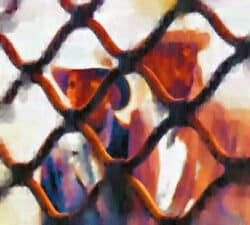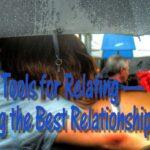- Some Thoughts on Relating — Real Relating
- Relating 101 — Real Relating
- I Wasn’t Going to do This — Real Relating
- Finding YourSELF — Real Relating
- Discover Yourself — Real Relating
Real Relating — I Wasn’t Going to Do This
I Wasn’t Going to Do This — learning to work through emotions without turning them into issues is a relationship must

Psst!! Hey!!!
** Want more great writing designed to help YOU to shift your behaviour?
** Want to learn how to find, build or deepen your principal relationship?
** Want to know more about Zen living and being?
Check out Wayne’s books! (amazon link)
Or, check them out right on our site.

“I wasn’t going to do this.” A most fascinating “client line,” one I heard in exactly the same context throughout my 32 year counselling career.
The line was always spoken precisely 3 seconds after the first tear coursed down the client’s cheek. The tear, combined with a rueful smile and a stifled sob, was the marker of a client that had gone a step deeper into their SELF.
This, as opposed to all the “gimmicks” clients brought with them to avoid doing any real work. Usually, this resistance has everything to do with the refusal to surrender into the pain of the real work — refusal to consider changing — refusal to show “weakness” by giving up the illusion of control.
There is, of course, a perverse logic to this resistance to real relating.
A person, for example, in relationship with someone into control, power, abuse, violence, has to learn to protect him / herself. This typically means that the person learns to hide their emotions — to erect walls — in an attempt to keep stuff out while keeping stuff in.
This is an arduous, painful process. Always, it’s accompanied by a hardness of the body — the muscles are tightened to protect and suppress.
Once learned, this way of dealing with relational stress, while completely inflexible, becomes a source of personal pride — “LOOK at me! Look at what I did!” — Thus the paradox: it’s what is necessary for people to survive abusive situations, but the price is that the person is shut down and locked in.
The question is: will this stance simply be used as an “escape” tool, or will it become a life-long way of being? If the latter, how does a tool go so very, very awry?
To understand the way this defense mechanism goes awry, we want to differentiate between acute and chronic stressors. A story, of course!
I went to an excellent inner city technical school in Buffalo, New York. In 1964–1968, it was the only High School in Buffalo with a computer, and I was into that in a big way.
It was also in a scary part of town.
Those of you that receive Buffalo TV will snicker — practically every night, the lead for Buffalo’s ABC network is, “Fire in Tonawanda, news at 6.” Or, “Murder on Chippewa, update at 11.” My school was 3 blocks from Chippewa Street.
Being young and short, I walked down Chippewa at top speed, looking neither right nor left. I’d breathe shallowly, tense my muscles (flight or fight reaction) and I’d have a pocket-knife in one fist, a set of keys extending between my fingers of the other.
Many were the nights that I’d get home from play rehearsals and find out a murder happened in an alley I’d passed at around the time of the murder.
I survived, obviously.
I went off to Chicago, or specifically Elmhurst, 20 miles West. The keys went away, and I got comfortable in a small town.
Then, I came to Canada. My first evening in downtown Toronto, circa 1976, I found myself tight, breathing shallowly and clutching my knife and keys.
I then did an interesting thing, which I highly recommend.
I stopped. I opened my eyes, my ears and my senses. I asked myself, “Do I sense a real threat, or am I over-reacting to my memory and imagination?”
Part of me, the part that had survived the mean streets of Buffalo, was scared and angry. The rest of me noticed that there was absolutely no real threat at that moment, in Toronto.
- Acute “anything” is specific. In my above example, acute danger was each time I walked down Chippewa Street at 9 PM, heading for a bus, at age 16.
- Chronic “anything” is an ever-present, non-specific feeling. It’s remaining in a state of acute anxiety or fear while sitting alone in a church pew, so to speak.
Now you can see the difficulty some people create for themselves. All “stuckness” comes from allowing an acute experience become a chronic state. You’ll know you’re in one if you think you are “entitled” to feel something, due to “circumstances.”
Let’s unpack. Being in a situation that I generate a fight or flight response over is, by definition, an acute situation. It is acute because, short of dying during the experience, all experiences end, and any experience can be exited.
However, many people “choose” to stay in a dysfunctional relationship or situation — either because they fear being alone, or don’t feel powerful enough, or have been trained to “fix things.”
They then create all kinds of stories about how the situation is going to get better “some day.”
As soon as they do this, what is acute becomes chronic. The thinking moves from “This is a situation I am in,” to “This is who I am.”

So, that’s one type of stuckness, and clients used to tell me how they “have no choice, no options” when they were in this place.
Many had been in therapy for years and learned nothing. Of course they hadn’t — you can’t learn something new if you think it is irrelevant to your self-imposed rigidity.
The other type of stuckness comes from finally finding the power to exit the situation without exploring the acute-chronic dichotomy.
Here, the person finds the internal power and a way to exit the painful situation. However, and it’s a big however, they don’t exit the internal dynamic.
Example: “I was a victim of abuse in my last relationship. I finally learned to stand up for myself and I got out of the relationship. Now, for the rest of my life, I am going to be powerful, wary, closed and defensive. That way, I’ll never be a victim again.”
There’s a problem here. Big problem. What’s happening is that the person is moving from a specific (acute) relationship with a specific person to a generalization (chronic).
One client had exited an emotionally abusive relationship 9 years earlier. She came for therapy to resolve issues with her kids. We came up with a strategy. We spent 2 more sessions together; all she would do was generalize about what she’d learned about good communication, how to stay focussed and her “spiritual development.”
From my side of the room, it was like I was bumping up against a smiling wall.
Her affect was gentle and caring and articulate. The feeling i felt was hard and cold and stony and closed. So, I asked, “How and where are you in all of this?” Instant tears, and “I wasn’t going to do this.”
She then began to talk about not trusting men, about how if you let down your guard someone pulls the rug out from under you, how if you show tears (which she equates with weakness), “Men rush in and try to take care of you. And they want stuff in return.”
She let me know she was afraid to ever let her guard down; it was even scary to talk about it. It was her last session.
Another client was a nurse. She came in because she had been diagnosed as “depressed.” The “depression” had existed off and on for 10 years. Drugs were no longer working. She’d also had a session with another therapist the day before. This bright light, when told of her depression, offered a one-line cure: “Everyone knows that it’s impossible to have a brisk walk every morning and be depressed.” Ouch.)
I listened, I heard the short story of her life, and said, “Hmm. You spend your work life dealing with hurting people. You’re surrounded by sickness and death. Then, you rush home to look after your family. You’re on call to “fix” your friends. Who are you and where are you in all of this? Afraid your life is passing you by and you’re too busy to get a hold of yourself?”
She sighed. “I wasn’t going to do this.” Tears. And she dug in, and learned to look after herself.
This week, you might wonder, “Who are you and where are you in all of this?” What have you clamped down onto, like a dog worrying a bone, fearful of giving up?
What acute situation have you declared to be chronic? What lies beneath your tough, hard, unyielding surface? What will happen if you open, just a bit?
What will happen if you surrender your need to be special, stuck inside the tower of your chronic inability to choose vulnerability? Where are you???





